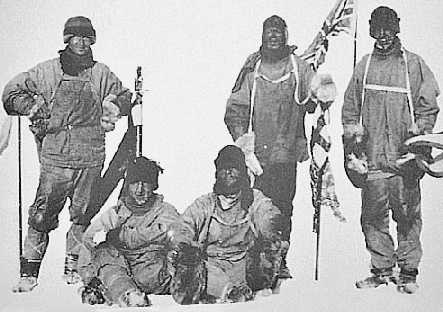Until the end of the 19th century, only sealers and whalers had set foot on the desolate southern land we call Antarctica. Until as late as 1820, no one had even seen its mainland. In the 1890s however, explorers of various countries began to compete for being the first to reach both the North and the South Poles. In 1901-04 Captain Robert Falcon Scott (1868-1912) was the first person to explore Antarctica extensively by land.
How did the Antarctic get its name?
ore than 2000 years ago, Greek writers described a large mass of land in the south of the world. Even though they had never seen it, they believed it must exist so that it could 'balance' the land they knew about in the northern half of the world. They named this imagined land 'Anti-Arkitos', meaning the 'opposite of the Arctic'.
Did explorers before Captain Scott try to reach the Antarctic?
Yes. For instance, one aim of Captain Cook on his second Pacific voyage of 1772-74, was to find the great southern continent. He sailed all round Antarctica but ice and fog prevented him from getting far enough south to see it. Cook decided that people would probably never travel further south than latitude 71 degrees, the position he reached. This was still more than 1000 miles from the Pole.

Robert Falcon Scott - Antarctic Explorer
"The work involved in the stress of contest with the mighty powers of Nature in the Antarctic regions calls for the very same qualities as are needed in the stress of battle. Our application is that a young Commander should be allowed to take charge of its executive work...Youth is essential in polar service. No efficient leader of discovery in icy seas has ever been over forty, the best have been nearer thirty."
Markham offered three names: Commander John de Robeck, aged thirty-eight, Robert F. Scott, aged thirty-two and Charles Royds, aged twenty-four. Although Robeck's request was denied, Scott and Royds were approved for release on April 5, 1900. The joint committee met on April 18, 1900, and Markham informed the committee that the Admiralty had released Scott and Royds. Sir William Wharton, of the joint committee, was extremely angry at Markham for going over the committee's head and assuming authority for naming leadership. Meanwhile, the remaining committee members were furious and now Scott's appointment was questionable. At the next meeting, on May 4, another committee was appointed to settle the issue, six on Markham's side and six on the side of the "hydrographic clique" who would "strive to secure a job for the survey department with obstinate perversity". As luck would have it, at the next committee meeting on May 24, two of the "hydrographic clique" representatives stayed away which placed the majority with Markham. The fight was over as Scott's appointment was confirmed. The next day the committee unanimously approved Scott as the expedition leader.
In December 1900 Professor Gregory arrived in Great Britain from Australia to organize his side of the expedition. When he arrived in London he was shocked to learn of his position on the team since he expected the Antarctic command had been placed under his direction. He expected to lead the expedition on the ice while Scott wintered over in Melbourne. According to Markham, instead of going to work on his scientific program, Gregory set about conspiring with the hydrographers to have Scott's leadership role overturned. Try as he might, Gregory was unsuccessful in his bid to capture the command. In May, 1901, Gregory was sent a telegram with a choice to either serve under Scott's command, or resign. Gregory resigned in disgust. Dr. George Murray, head of the botanical department of the British Museum, was appointed in his place on the condition that he go only as far as Melbourne to give scientific advise and training to the other scientists and then return to his duties at the museum. Gregory went on to occupy the Chair of Geology at Glasgow University for twenty-five years. At the age of sixty-eight, while crossing a river in Peru, he drowned.

South Pole expedition Jan 18 1912 L to R: Edward Wilson, Edgar Evans, Scott, Lawrence Oates, Henry Bowers


